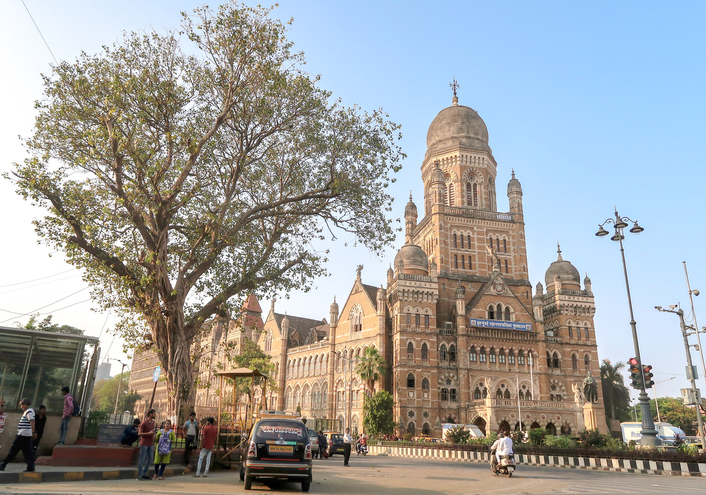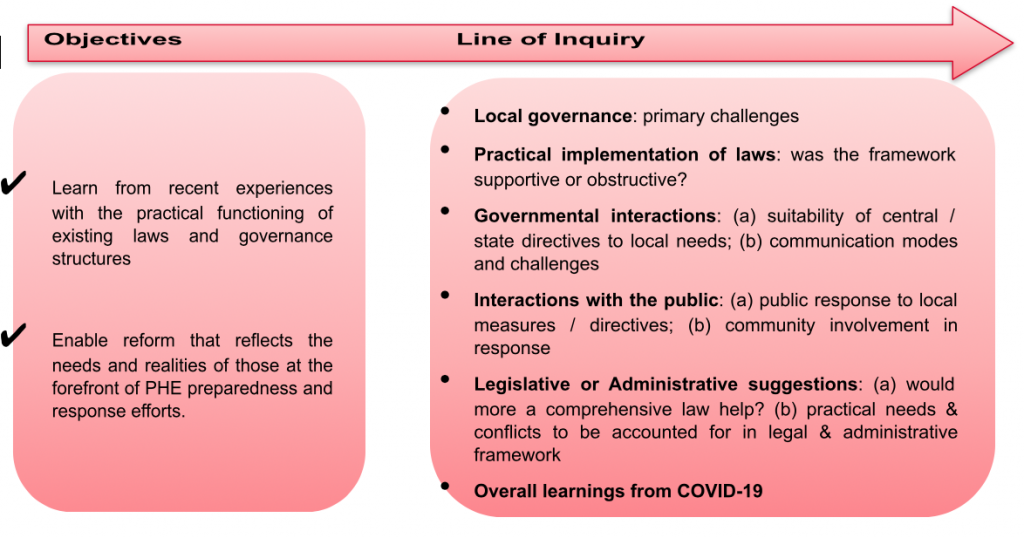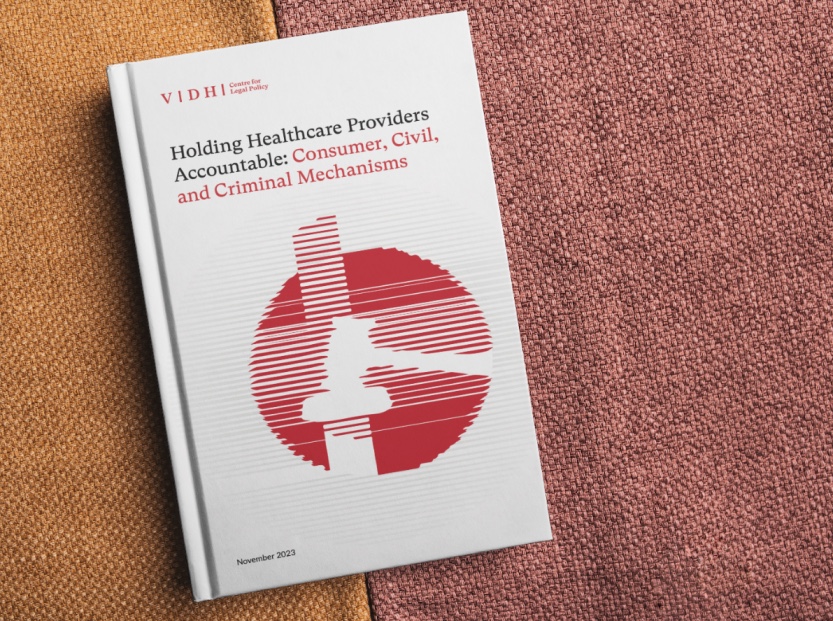
Learnings from District Administrations
Studying the role of district administrators in response to the COVID-19 pandemic
Introduction
From the outset of the COVID-19 pandemic in India, district administrators were given the foremost role in the pandemic response at the sub-regional level, by applying Section 69 of the Disaster Management Act, 2005 (‘DMA’). Central and state government orders tasked district administrators with managing the pandemic within their respective jurisdictions, utilising the powers bestowed on them, directly, by the DMA, and through state-level regulations issued under the Epidemic Diseases Act, 1897 (‘EDA’). District administrators are reported to have performed various roles, including coordination with state agencies to develop informed pandemic-response policies.
However, existing legal and governance frameworks for public health emergency management, appear to have fallen short in the face of a major pandemic. The planning and management involved in the nationwide lockdowns, containment of contagion and healthcare capacity – especially in the second wave, the effect of the pandemic on other human rights and the economy, have faced heavy criticism.
It is therefore important to study the legal and administrative framework within which the frontline governance in India operated, and understand the experiences and challenges of administrators at the district level.
A 2021 study of local governance and COVID-19 in India, points to empowering and investing in local authorities, as having significant potential to facilitate public service delivery and other state functions, including, specifically, in coordinating responses to extreme climate events and other disasters. Further, Vidhi’s March 2021 White Paper titled ‘What Should a Public Health Emergency Law for India Look Like?’ examines the role of the law in public health emergency (‘PHE’) preparedness and response, and public health at large. The White Paper points out that the “…existing Indian legal framework on PHEs needs to be re-evaluated to address its various shortcomings and incorporate the necessary aspects of a modern PHE legislation in a manner appropriate to the Indian context.”
It goes on to identify various issues that should be considered as part of this exercise, including the following:
- the need for legislation that:
- caters to the specific needs of each state;
- outlines the division of responsibilities between the different tiers of government;
- institutes adequate inter- and intra-governmental coordination mechanisms;
- the capacity of the existing administrative infrastructure to handle PHE preparedness and response activities as envisioned under a modern PHE framework;
- the need to ensure the complementarity of the law vis-à-vis administrative protocols, and the effectiveness of both of these, in practice.
In this context, our project attempts to understand the legal, governance, and capacity challenges that district administrators faced during the COVID-19 pandemic with a view to informing more modern approaches to PHE management.
Overview of the study
The aim of our study was to learn from recent experiences with the practical functioning of existing laws and governance structures, so as to enable reform that reflects the needs and realities of those at the forefront of PHE preparedness and response efforts. In particular, we hope that the findings of this study will help:
- incorporate a realistic third-tier perspective in the drafting of effective PHE legislation
- identify optimal routes to facilitating participatory governance in PHE management
- highlight the areas of PHE preparedness and response that are better met through administrative or informal routes, than legislative provisions.

Methodology
The study used qualitative methods, including personal interviews supplemented by and analysed through the lens of literature reviews and learnings from related projects conducted by the organisation. Semi-structured personal interviews were conducted with fifteen individual administrators at the district-level, across the eight states in the country. Initially, we had shortlisted one district for every state/ union territory, and also tried selecting districts from different geographical zones of the country. However, it was soon realised that administrators in service were more likely to respond with candour if they were known to us directly or through indirect networks. Therefore, participants were selected based on accessibility and willingness to participate in the study through a mixture of purposive and convenience sampling methods. Findings from interviews were analysed to identify commonality/ consensus as well as divergence in the problems, solutions, and administrative approaches of the different districts.
Learnings about practical concerns with implementing legislation and executive orders have been distilled with the aim of formulating specific recommendations with respect to PHE legislation.
Takeaways from the study
The most significant learnings from the study are as follows:
- The existing laws relating to disaster management and PHEs were seen by administrators as enabling legislation to devise PHE management strategies, rather than providing guidance or restraint to the exercise of their powers. The laws were mentioned in administrative orders as the source of the power to issue such orders and enforce their implementation, but they were not relied upon for substantive provisions on disaster management. This indicates that the content of the law itself was not that relevant for administrators at the time of devising structures or instructions pertaining to PHE management.
- Among the participants, only one stated that their district evolved district-specific guidelines for COVID-19 management. They had evolved comprehensive guidelines involving cross-departmental coordination in the district, and would regularly modify them on the basis of orders and guidelines received from central ministries and state departments.
- Penalties under criminal law were often cited by administrators in their orders as consequences for non-compliance with their instructions. While some participants mentioned the administrative ease that came with such penalties, others expressed hesitance with broad application of such powers. Over-reliance on criminal law is also not aligned with optimal public health approaches.
- Rather than application of legal provisions, informal relationships and communication within the government structure and with the public proved more relevant for PHE management. For example, reaching out to seniors or batchmates in the administration helped administrators understand instructions and best practices. Pre-existing relationships with community leaders helped them in reaching out to the public and building trust.
- Priority seems to have been given to administrative ease as opposed to public health approaches which centre the community and scientific evidence. For instance, some districts were ordered to test contacts of COVID-19 patients for COVID within three days of identifying such contacts, so that they could move on to other patients. This was opposed to scientific evidence which suggested that it may take up to seven days from the date of contact to test positive for the viral infection.
- Coordination between different levels of government was not reported to be a significant issue in most cases, and formal as well as informal means of communication were used by administrators. Participants mentioned that apart from regular inter-district videoconferences and meetings with the state leadership, they would call or message other officers informally for swift communication. The issue pertained more to rapidly changing minutiae of instructions from different levels, which hampered management on the ground, because it was difficult to communicate these changes efficiently to other members of the administration and the public.
- Approaches to governance during the pandemic depended more on individual administrative styles and culture rather than on legal or policy guidance. While some basic instructions regarding the lockdown, containment, vaccination, etc. remained applicable to all administrators, public involvement and communication, creation of social safety nets (like strengthening shelter homes and mental health networks), and other community-friendly initiatives were left to the prerogative and initiative of individual officers.
Recommendations
- District Administrative officers need adequate training and support for the numerous roles and diverse range of responsibilities they occupy / with which they are tasked.
- There is a need for clearer and more comprehensive PHE preparedness & response protocols, in addition to better personnel training and capacity building – especially at the local level. While it may not be possible or desirable to devise standardised protocols for all PHEs, orienting administrators to the basics of people-centred, and evidence-based public health governance is essential.
- Such a framework should anticipate increased strain on public infrastructure during a PHE and provide for stand-ins to facilitate delivery of other essential public services.
- A heavily top-down approach to a PHE response can conflict with ground realities, and hinder local efforts; therefore, there is a need for improved investment in, and empowerment of, the third tier, to build capacity, and facilitate bottom-up contributions to the planning and implementation of PHE preparedness and response measures. The importance of empowering the third tier was also highlighted in our white paper, which studied PHE frameworks in six jurisdictions (UK, USA, Canada, South Africa, South Korea, and Brazil) and studied their experiences with PHE management.
- There is a need for improved monitoring and evaluation metrics at the various levels of governance to align with the goal of people-centred and evidence-based PHE management.
- Such a framework should facilitate meaningful inclusion of diverse members of the community and civil society, in PHE preparedness and response
- There should be a larger focus on building resilient systems, rather than expecting people to be more resilient in times of distress




